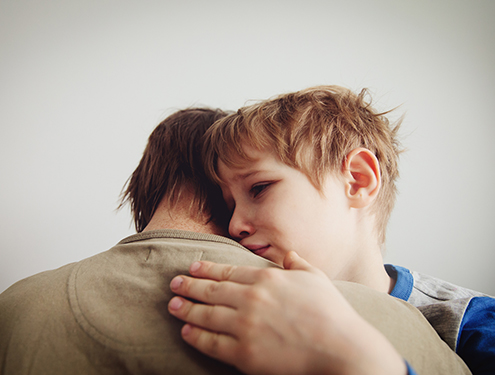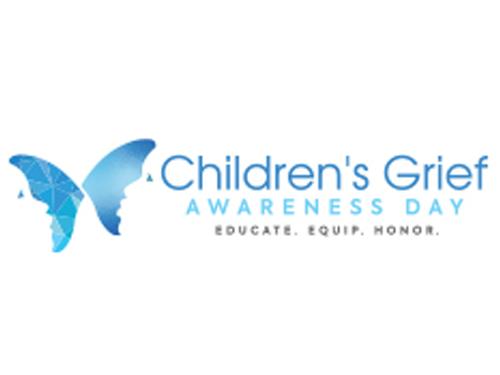How can we help?
888-283-1722
Call us now at 888-283-1722
24/7 Referrals and Nursing Support
Voices of Care Blog

Q & A: How to Help Grieving Children
Posted on March 16, 2022 by Care Dimensions Children’s Program StaffWith the COVID-19 pandemic taking over 900,000 lives in the U.S., there’s a good chance your child knows either someone who has died recently or a friend who has lost a loved one.
Children grieve differently than adults and often need help understanding and expressing their feelings during such a confusing time. Parents also need guidance on how to help their children cope with the grief.
In observance of March as Child Life Month, here are some common questions Care Dimensions child life specialists handle when helping parents of children who have someone important receiving hospice care or has already died.
Q. Should a child visit a dying loved one?
A. Yes, if he wants to. Acknowledge fears and feelings related to visiting someone that is very sick and clarify misconceptions. Prepare them for the visit by describing the loved one’s surroundings. If the loved one looks/acts different, explain what the changes are. Remind the child that, “Even though Grampy may look different, he’s still the same person on the inside.” Remind the child that this is a good opportunity to continue making memories while the person is still alive. Children deserve time to experience the dying process and say goodbye.
Q. How do I talk to my child about an unexpected death?
A. A murder, suicide, or a death by accident can cause intense emotions. A child may feel she caused the death. Always be honest and open using age-appropriate language to help clarify misconceptions. Start off by offering short and simple explanations of what’s happened. “I have something very sad to share…”
“Dad was killed by someone who used a gun to hurt his body.”
“Mom took a lot of pills and it make her body stop working.”
“Auntie was driving and another car crashed into hers by accident. Her body got so hurt, that it stopped working and she died.”
Because each situation is unique, we suggest contacting your caregiver, social worker or calling Care Dimensions’ Grief Support staff at 855-774-5100 for specific recommendations on how to tell your child about a traumatic and/or sudden death.
Q. Should my child attend the services?
A. Yes, if the child wants to. Give him a simple explanation such as, “This is a special time when people get together to say goodbye to someone they care about.” Ask him if he wants to attend; give him the choice. If your child is going, let him know what to expect. Describe or visit the funeral home or place of worship before the service. If the body is to be on view, be honest and give details of what he will see and discuss how that will be the last time they will be able to see their loved one’s body. Talk about it. Consider having an adult available to spend time with kids in another room or take kids home early if things begin to feel overwhelming.
Q. What’s the most important thing I can do for my child when someone they love dies?
A. What’s most helpful for children during these difficult times is to be with grown-ups they know, love, and trust.
Q. How do I know if my child needs more support with their grief?
A. Children who are grieving may benefit from being around other children who have experienced a similar loss. It is normal that they may exhibit some of these symptoms: sudden behavior changes, nightmares or fear of being alone, withdrawal, depression, constant changes in school performance or continuous physical complaints (headache or stomach ache). If these problems seem extreme or persistent be sure to seek professional help.
For additional information and support for children and families who are grieving, please contact our children’s program at 855-774-5100.
Additional resources:
See our Children’s Grief Resources page for links to guides, articles, videos, webinars, organizations, and more.
Additional Posts
Memory Making Activities for Children Before and After a Death
Posted on November 17, 2025 by Bridget McHallam, Child Life Specialist Intern in ChildrenFor many children and teenagers, engaging in memory-making activities can be a meaningful way to express love, connection, and remembrance. Here are some suggested activities. ...
Continue readingChildren's Grief Awareness Month: Why it Matters
Posted on October 28, 2025 by Kasey Griffin, MS, CCLS in ChildrenEvery November, we recognize Children’s Grief Awareness Month. Here are some tips on how you can help children who are grieving. ...
Continue readingUnderstanding "Grief Fog": The Science Behind What You're Feeling
Posted on October 28, 2025 by By Heather Arteaga, LCSW, Greater Boston Bereavement Coordinator and Patrice DePasquale, LICSW, Director of Bereavement and Pediatric Palliative Care ProgramIf you've lost someone dear to you, you may have experienced what grief counselors call "grief fog.” Read strategies to help get through this phase. ...
Continue readingAnyone—patient, family, care provider—can make a referral. Fill in the form online or call us today.
Since 1978, Care Dimensions, formerly Hospice of the North Shore, has provided comprehensive and compassionate care for individuals and families dealing with life-threatening illnesses. As the non-profit leader in advanced illness care, we offer services in over 100 communities in Massachusetts.
Copyright 2025 | Care Dimensions, 75 Sylvan Street, Suite B-102, Danvers, MA 01923 | 888-283-1722 | 978-774-7566 |









